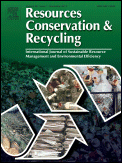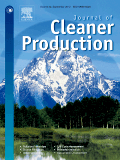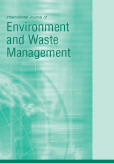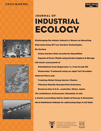
RESOURCES CONSERVATION AND RECYCLING
Scope & Guideline
Championing sustainability through rigorous academic discourse.
Introduction
Aims and Scopes
- Sustainable Resource Management:
Research focuses on methods and policies to manage natural resources sustainably, ensuring their availability for future generations while minimizing environmental impact. - Innovative Recycling Technologies:
Investigating advanced techniques for recycling various materials, including metals, plastics, and organics, to enhance recovery rates and reduce waste. - Life Cycle Assessment (LCA):
Utilizing LCA to evaluate the environmental impacts of products and processes, providing a comprehensive view of their sustainability. - Circular Economy Practices:
Exploring frameworks and models that promote circular economy principles, focusing on reducing waste and maximizing resource utility. - Environmental Policy and Governance:
Analyzing the effectiveness of policies and regulations aimed at promoting resource conservation and recycling at local, national, and global levels. - Technological Innovations in Waste Management:
Researching the role of new technologies, such as AI and machine learning, in enhancing waste sorting, recycling efficiency, and overall waste management.
Trending and Emerging
- Resource Recovery from Waste:
Growing focus on innovative methods for recovering valuable materials from waste streams, such as metals from electronic waste and nutrients from agricultural by-products. - Biotechnological Approaches to Recycling:
Emerging research on the use of biotechnology, including microbial processes for waste treatment and resource recovery, is gaining traction. - Decarbonization Strategies:
Heightened interest in strategies aimed at reducing carbon emissions across various sectors, particularly in energy-intensive industries and transportation. - Sustainable Agriculture Practices:
Increasing research on sustainable practices that effectively integrate waste management and resource recovery in agricultural systems. - Circular Economy Metrics and Assessment:
Development of frameworks and indicators for measuring circularity in various sectors, reflecting the need for quantifiable assessments of sustainability efforts. - Social and Behavioral Aspects of Recycling:
Emerging studies examining consumer behavior, social attitudes, and community engagement in recycling practices, highlighting the importance of public participation in sustainability initiatives.
Declining or Waning
- Traditional Waste Disposal Methods:
Research on conventional landfill and incineration methods is decreasing as the focus shifts towards more sustainable and innovative waste management solutions. - Single-Use Plastics:
While still relevant, the urgency around single-use plastics is waning as industries pivot towards biodegradable alternatives and comprehensive recycling solutions. - Basic Waste Management Strategies:
There is a noticeable decline in studies focused solely on basic waste management strategies, with a growing emphasis on integrated approaches that consider the entire lifecycle of materials. - Generalized Environmental Impact Studies:
Research that does not incorporate specific case studies or localized impacts is becoming less common, as the journal favors detailed, context-specific analyses.
Similar Journals

Detritus
Transforming challenges into opportunities for environmental progress.Detritus, an esteemed open-access journal published by CISA PUBLISHER since 2018, serves as a vital platform for the dissemination of innovative research in the fields of Environmental Chemistry, Environmental Engineering, and Waste Management and Disposal. Based in Padova, Italy, the journal aims to foster scholarly communication and collaboration among researchers, professionals, and students dedicated to advancing our understanding of environmental challenges and solutions. With its open-access model, Detritus ensures that high-quality research is freely available, bridging the information gap within the scientific community. While currently categorized in the Q3 quartile across multiple environmental science disciplines, the journal is poised to further enhance its visibility and impact, contributing significantly to pressing global issues such as waste reduction and sustainable resource management. As the journal continues to evolve, it encourages submissions that advance theory and application in these critical areas.

Water Research X
Driving ecological insights for effective water management.Water Research X is a prestigious journal published by ELSEVIER, focusing on the dynamic fields of water science and technology, pollution, ecological modeling, and waste management. Since its inception in 2018, this Open Access journal has become a cornerstone resource for researchers and professionals dedicated to advancing our understanding and management of water resources. Based in the United Kingdom, Water Research X holds an impressive ranking within the Scopus metrics, positioned in the Q1 category across multiple relevant disciplines, including Environmental Science, with a notable rank of 10/261 in Water Science and Technology and 3/41 in Ecological Modeling. This reflects its commitment to disseminating high-quality research that informs policy, supports sustainable practices, and fosters innovation in water management.

Asian Journal of Water Environment and Pollution
Empowering research to safeguard our water environment.Asian Journal of Water Environment and Pollution is a leading academic journal published by IOS PRESS, dedicated to advancing the field of water science and technology, as well as pollution management. With its ISSN 0972-9860 and E-ISSN 1875-8568, this journal serves as a pivotal platform for researchers, professionals, and academics alike who are keen to explore innovative solutions and interdisciplinary approaches toward water-related challenges and environmental issues. Although currently positioned in the Q4 category for both pollution and water science & technology, the journal aims to foster impactful research and discussions that can enhance the understanding and treatment of water pollution. The Asian Journal of Water Environment and Pollution not only plays a crucial role in disseminating knowledge but also encourages the sharing of findings from unique geographic perspectives, particularly from Asia. As the field evolves, this journal is poised to become a vital resource for those looking to contribute to sustainable water management practices and pollution reduction strategies.

Journal of Cleaner Production
Leading the Charge Towards Environmental ExcellenceThe Journal of Cleaner Production, published by Elsevier Science Ltd, is a leading interdisciplinary journal dedicated to the development and dissemination of knowledge on environmental sustainability and cleaner production practices. With an impact factor that reflects its high relevance in the field, the journal is recognized as a Q1 publication in key categories including Environmental Science, Industrial and Manufacturing Engineering, Renewable Energy, and Strategy and Management as of 2023. This prestigious journal has been a platform for groundbreaking research since its inception in 1993 and continues to shape the dialogue around sustainable practices in various sectors. Researchers and professionals across disciplines can access its wealth of insights, which are critical for driving the transition towards more sustainable production and consumption models. The journal’s rigorous peer-review process ensures that only high-quality research is published, making it an essential resource for academics, industry leaders, and policymakers committed to advancing cleaner production methodologies.

International Journal of Environment and Waste Management
Empowering Research in Environmental SustainabilityThe International Journal of Environment and Waste Management, published by InderScience Enterprises Ltd, serves as a vital platform for researchers and professionals in the fields of Environmental Engineering and Waste Management. With an ISSN of 1478-9876 and an E-ISSN of 1478-9868, this journal encompasses a wide range of topics from innovative technologies in waste processing to sustainable environmental practices. Ranked in the Q3 category for Environmental Engineering and Q4 for Waste Management and Disposal in 2023, it holds significance in advancing knowledge and impacting practices in these essential domains. The journal accepts articles that contribute to the understanding and development of effective waste management strategies, ensuring alignment with contemporary environmental challenges. As it converges years from 2006 to 2024, it continues to attract contributions that reflect the latest research and methodologies. For scholars, students, and practitioners alike, this journal is an invaluable resource, enriching the dialogue around environmental sustainability and waste minimization.

Rocznik Ochrona Srodowiska
Catalyzing Sustainable Practices through Rigorous ResearchRocznik Ochrona Srodowiska, published by the Middle Pomeranian Scientific Society for Environmental Protection, is an esteemed journal dedicated to advancing the field of environmental science in Poland and beyond. With an ISSN of 1506-218X, this peer-reviewed journal has established itself as a vital resource since its inception in 2007, addressing various environmental issues and promoting sustainable practices. Currently holding a Q3 category ranking in the Environmental Science (miscellaneous) field for 2023, it places itself in the 23rd percentile of Scopus rankings, reflecting a growing influence in the broader environmental research community. While the journal is not open access, it serves as an important conduit for researchers, professionals, and students to disseminate their findings and contribute to the interdisciplinary dialogue aimed at tackling pressing environmental challenges. With a commitment to rigorous research and practical applications, Rocznik Ochrona Srodowiska remains an essential platform for fostering innovation and collaboration in environmental studies.

Journal of Material Cycles and Waste Management
Driving Research in Material Cycles for Environmental ImpactThe Journal of Material Cycles and Waste Management, published by Springer, stands as a pivotal resource in the fields of material cycles and waste management, addressing critical challenges related to the sustainability of materials and the efficient disposal of waste. With an impact factor reflective of its significant contribution to the scientific community, this journal publishes innovative research that spans a diverse range of topics, from recycling technologies to lifecycle assessment. The journal ranks in the Q2 category for both Mechanics of Materials and Waste Management and Disposal, highlighting its respected position in academia. Operating without open access, the journal seeks to engage researchers, professionals, and students alike, providing a platform to advance knowledge and foster collaboration in the pursuit of sustainable material management solutions. Located in Japan and adhering to a high standard of editorial excellence, the journal is a must-read for those invested in optimizing resource use and minimizing environmental impacts.

JOURNAL OF INDUSTRIAL ECOLOGY
Bridging Economics and Ecology for Sustainable DevelopmentJOURNAL OF INDUSTRIAL ECOLOGY, published by Wiley, is a leading academic journal that focuses on the intersection of industrial practices and ecological sustainability. With an ISSN of 1088-1980 and an E-ISSN of 1530-9290, this journal has established itself as a premier outlet for research in economic, environmental, and social sciences, evidenced by its Q1 rankings in key categories such as Economics and Econometrics, Environmental Science, and General Social Sciences as of 2023. Spanning over two decades from 1997 to 2024, it offers invaluable insights into innovative approaches for designing sustainable industrial systems, informing policy decisions, and advancing interdisciplinary collaborations. While the journal does not currently offer open access options, its high impact in the field—illustrated by its impressive Scopus rankings, where it ranks 5th among 275 in General Social Sciences and 23rd among 233 in General Environmental Science—reinforces its importance to researchers, professionals, and students dedicated to the principles of sustainable development and industrial ecology.

Resources Conservation & Recycling Advances
Shaping the future of recycling with cutting-edge insights.Welcome to Resources Conservation & Recycling Advances, an influential open-access journal published by Elsevier since its inception in 2021. With an ISSN of 2667-3789, this journal serves as a vital platform for disseminating cutting-edge research in the fields of economics, waste management, and environmental science. Recognized for its high impact, it proudly holds a Q1 ranking in both Economics and Econometrics as well as Waste Management and Disposal, highlighting its significance within these critical categories. The journal aims to advance understanding and innovation in resource conservation and recycling practices, making it an essential resource for researchers, professionals, and students dedicated to sustainability. With its current Scopus rankings placing it in the top percentiles—34th out of 716 in Economics and Econometrics and 21st out of 134 in Waste Management—Resources Conservation & Recycling Advances continues to contribute to meaningful discussions and developments in the pursuit of a more sustainable future.

Journal of Hazardous Materials Advances
Empowering sustainable practices through rigorous science.The Journal of Hazardous Materials Advances, published by ELSEVIER, is a premier open-access journal dedicated to advancing the understanding and management of hazardous materials. Established in 2021, this journal has quickly gained recognition, securing a place in the prestigious Q1 quartile across multiple categories, including Environmental Chemistry, Environmental Engineering, Health, Toxicology and Mutagenesis, Pollution, and Waste Management and Disposal. With its impactful research indexed under ISSN 2772-4166, the journal not only prioritizes quality but also promotes accessibility to its scholarly outputs, ensuring that vital findings are readily available to the global research community. As part of Scopus, the Journal ranks competitively in various subfields of Environmental Science, reflecting its vital role in addressing contemporary environmental challenges. Researchers, professionals, and students can rely on this journal to provide innovative insights and solutions in the ever-evolving landscape of hazardous material management and its implications for public health and environmental sustainability.